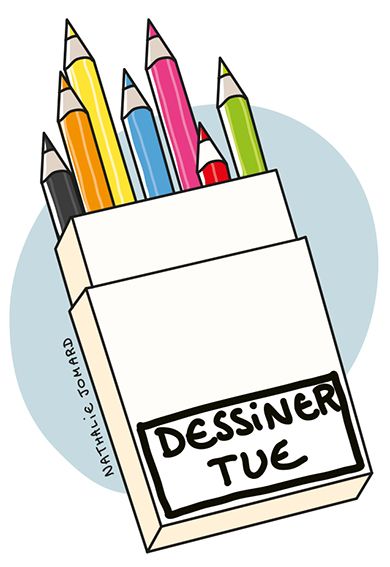 |
| Warning: Drawing Kills |
Because, apparently, the magazine had dared to print cartoons that radical Islamists in France and undoubtedly abroad as well found offensive.
The weekly journal Charlie Hebdo, which takes its name partially because it was an outlet for Peanuts cartoons (hence, Charlie) and partially due to its frequency of publication ("hebdo" in French is short for Hebdomadaire, or weekly) has long been an instrument of satire, some plainly in questionable taste. Its targets were somewhat indiscrimant; one week it would be President Hollande. The next, Pope Francis. Frequently, it poked fun at Islamists.
The blow is like a crash of thunder in a country whose motto is "liberté, égalité, fraternité" ("libery, equality, and brotherhood"). The killing of satirists is a chilling attack at free speech and free thought in a very real way, unlike the sorts that are often held out as examples elsewhere.
I am struck by the reaction for a couple of points. First, the hypocrisy to a point of the US government, who seem now ready to stand, maudlin shoulder to maudlin shoulder with a magazine that just three years ago it attacked publicly; in the words of then spokesman Jay Carney:
We are aware that a French magazine published cartoons featuring a figure resembling the prophet Muhammad, and obviously we have questions about the judgment of publishing something like this,Another truly bizarre, through-the looking glass reaction can be had from Nicholas Kristof, columnist for the New York Times. Like the famous "#IllRideWithYou" forelash against imagined anti-Moslem violence in Australia following another terrorist attack in Sydney last month (it's not even accurate to call it a backlash, as it turns out the story that provoked the incident was made up almost of whole cloth), Krisrof talks about Islamophobia and how people jumped to conclusions that the perpetrators were Islamist when others (Christians, Jews, right wingers) had grievances as well.
Kristoff has become almost a caricature of himself. The comment about why people concluded it was Islamist radicals ("(w)e don't know exactly who is responsible") stands in direct conflict with the facts. It was *immediately* known that the killers shouted Islamists slogans (Allahu akbar, "On a vengé le prophète Mohammed") and they were described by eyewitnesses immediately.
I live in Paris and this was documented on social and other media within minutes. In fact, it turns out that the perpetrators were exactly who we thought that they were, and also in fact, at least one was known to the police for radical activity.
Kristof is making excuses and projecting in a naseauting and clueless way. Why would anyone conclude that the killers were Jewish or Christian? This column would not have been written by a sane, informed, non-tendentious writer. The information was available. He works for a newspaper for Christ’s sake.
People are asking what it all means to France, and there is right now a lot of bravado about standing together in solidarity and the importance of freedom.
As a foreigner living in France, I am going to take a contrarian view and say that in the long run, it will likely mean little more than a continued erosion of freedom of speech here.
Politicians like François Hollande will issue mawkish statements about solidarity with the writers, the confreres of Charlie Hebdo will replace their banners with black-ink as an hommage, but in the end, the key players are not going to do more than STOP printing cartoons and other material they think is scandalous.
Recall that France, unlike some other nations, does not have a real freedom of press. Writers and actors are prosecuted for making statements that "incite hatred" (witness the fracas last year with the "comedian" Dieudonne Mbala Mbala). Even today, one of the two leading papers here in Paris (Le Figaro) has re-tweeted several times how people can report racist or offensive tweets or posts on social media.
I expect that we will see more - not less - of this.
One thing further to keep in mind is this - a few years back when Jyllandsposten in Denmark printed a cartoon deemed "offensive" to some Muslims, newspapers in France - Le Monde and Le Figaro included - refused to show the cartoon even in stories about the controversey. Charlie Hebdo was one of a very small number who ran the cartoon.
Sadly, I think that that is likely to be what this event will mean ultimately here.
And I am less concerned right now about the rise of xenophobia or votes for Marine Le Pen and more concerned about self-censorship. And surely more concerned that 12 people, including two policemen, lost their lives.
No comments:
Post a Comment